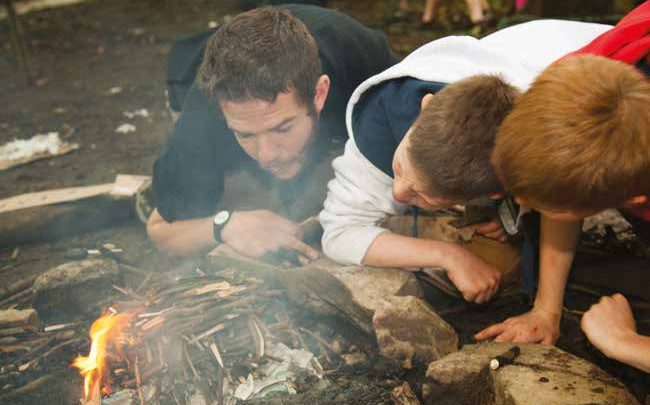Residential trips for schools – Why every child deserves a school residential

Learning away from school and home can help your pupils grow in confidence, develop independence and improve across the curriculum, says Jamie Walls…

- by Jamie Walls
It’s proven that whether you’re taking primary or secondary school pupils, quality residential trips for schools are hugely beneficial from an educational perspective.
Indeed, there is a growing body of evidence demonstrating the positive impact of residential experiences both on young people’s academic outcomes and their wider development – the independent research by York Consulting into residential learning provides fantastic insights into the difference these trips can make, for a start.
In spite of what the research says, schools, teachers and parents alike can sometimes be hesitant to commit to residential trips for one reason or another – be it the cost, planning, time or stress involved.
But the benefits outweigh these perceived cons, and support is available for those who want to take the plunge.
Breaking barriers
How can residential trips for schools benefit pupils in the primary years? It’s difficult to know where to start!
The change of environment can provide inspiration and help to improve creativity amongst pupils (and teachers) across a whole range of subjects – but it doesn’t stop there…
Residentials provide an opportunity to break down the barriers between pupils and teachers, and education and the classroom. Relationships can be forged and built upon over the course of a trip that may not have naturally grown in the traditional school environment.
Removing seating arrangements and the physical obstructions between pupils and teachers allows new interactions and broadens the circles of those that take part.
Long-term follow-up responses after a residential experience found that 84% of KS2 students felt that they knew their teachers better, and 75% felt they got on better with their peers.
In fact, according to Learning Away, when residential experiences are integrated with the curriculum, are inclusive and progressive, and involve staff and students in planning and following up, the sense of cohesion and of belonging to a community is enhanced throughout the whole school.
Boosting confidence
Another more obvious benefit of residential trips is the immediate boost in confidence that pupils and teachers alike can gain from them. In fact, this is the benefit most likely to be identified by pupils.
Student leadership skills naturally emerge in a residential environment, and often in those that you may least expect it from. These types of experiences move pupils out of their perceived comfort zones and facilitate a new learning and social environment.
For many pupils, such a trip could be their first time staying away from home. The sense of independence and adventure generated can spark excitement and self-belief in even the most timid, developing their resilience and self-confidence.
Ofsted agrees: in a 2008 report about learning outside the classroom, it stated: “When planned and implemented well, learning outside the classroom contributed significantly to raising standards and improving pupils’ personal, social and emotional development.”
Supporting learners
One of the lesser recognised benefits of residential trips is the impact they can have on the progress of lower-attaining pupils, who may have difficulties with concentration and engaging in a classroom environment.
In the primary years, in particular, residential trips can help to develop pupils’ speaking and listening skills, and broaden their vocabulary.
Study and research skills can be developed in a way that means they are more likely to be retained by less academic children – the out-of-classroom learning environment can break down barriers to learning and allow information to be absorbed.
Outdoor activities on residential trips for schools
The aforementioned confidence boost can also mean that quieter students are more likely to put forward their views and engage in group discussion. The support residential trips for schools provide pupils needn’t be restricted to term time, either.
Cathedral Academy in Wakefield, for example, used the LOtC-approved site YHA Castleton Losehill Hall, in Derbyshire, to pilot a successful summer school with Year 6 pupils before their transition to Year 7.
They undertook a number of outdoor activity programmes, including bushcraft, shelter building, archery and orienteering in the 27-acre grounds of the venue.
“The summer school had a positive impact on all students,” Kat Cafferky, vice principal of Cathedral Academy, who organised the trip, commented. “Their confidence grew by the day; they made many new friends and were glowing by the end of the week.”
Choosing wisely
It probably goes without saying, but it’s vital to have the right environment for a residential school trip, and having the right facilities available at your destination underpins its success.
The Learning Outside the Classroom (LOtC) Quality Badge is something to look out for in particular when browsing school trip ideas. It is the only nationally recognised indicator of good quality educational provision and effective risk management – making it easier on the risk assessments front.
Having this quality standard means the red tape associated with a school trip is reduced. There are currently around 1,000 providers with the quality badge, with YHA boasting more than 80 LOtC-accredited sites alone in England and Wales.
It’s important to point out that planning is key; a brilliant residential does not happen all by itself. It requires teachers and the provider to work together to identify what you want to achieve and how it will be done.
The easiest and most effective way to ensure your residential school trip runs smoothly and delivers at every level, for both staff and students, is to engage with a recognised and trusted provider of school trips.
Finally, it may sound obvious but choose a destination that complements the topic or subject area you wish to cover.
For example, YHA has several locations of historic and geographic importance – YHA The Sill at Hadrian’s Wall is located close to the iconic Sycamore Gap and the Roman site at Vindolanda and is popular with many educational and youth groups who visit Hadrian’s Wall and Northumberland National Park for history and geography field trips.
Unforgettable experience
The most important thing to say about a residential trip is that pupils will walk away from it with memories that they will cherish and an experience that will add to their academic journey.
No fewer than 82% of KS2 pupils surveyed by York Consulting were proud of what they achieved on their residential and 58% thought they would do better in their schoolwork as a direct result.
Start planning your trip
Follow these simple tips to ensure your residential goes smoothly…
- Book a pre-visit
By arranging a pre-visit, group leaders can get a feel for the residential destination. They can also talk to staff, get assistance with any paperwork necessary and see the activities first-hand. - Check facilities
Do you know what catering and sleeping arrangements are available? Ensure that your groups have dedicated rooms and that the catering is not only offered but of good quality with any dietary requirements catered for too. - Book early
Popular LOtC-accredited destinations can be sold out up to a year in advance – book early to avoid disappointment.
Jamie Walls is product development and delivery manager at YHA. YHA (England and Wales) offers support to schools who choose a YHA School Trip at any one of its 150 locations – for more information, visit yha.org.uk.









